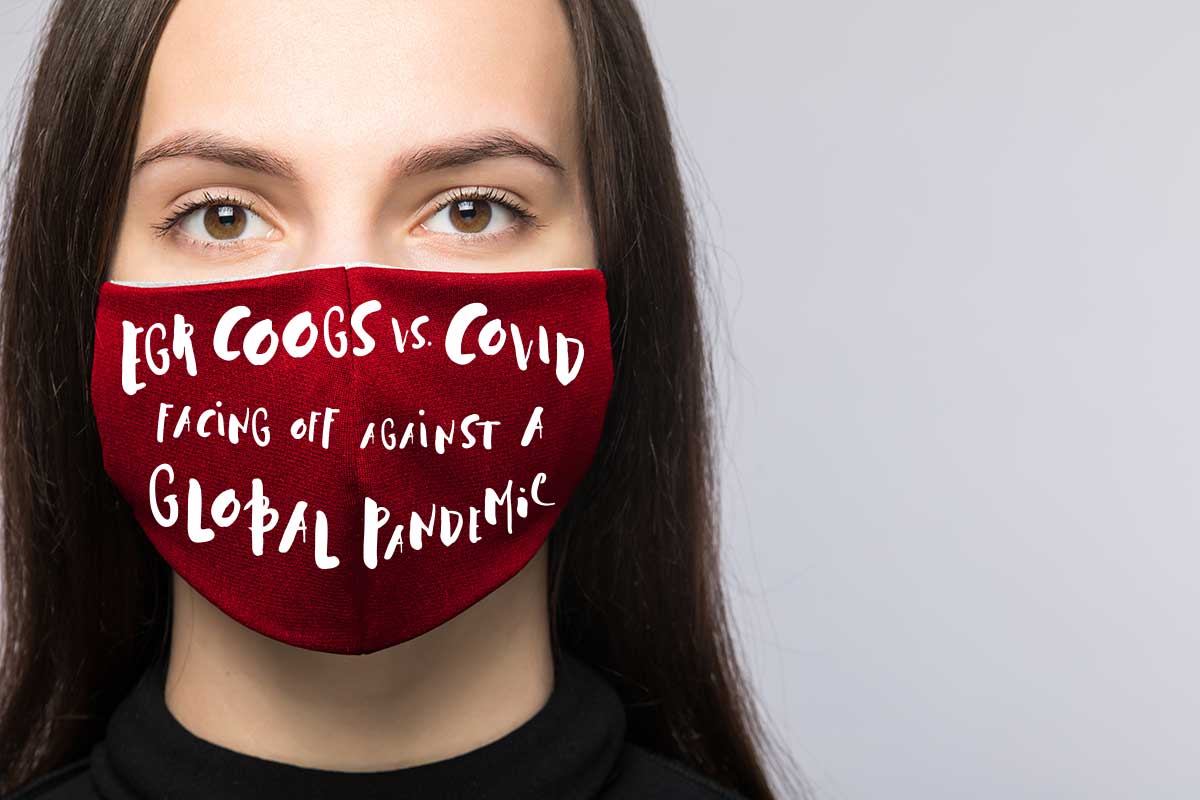
IN MID-MARCH, AS THE NOVEL CORONAVIRUS BEGAN TO RIP THROUGH HARRIS COUNTY, THE UNIVERSITY OF HOUSTON MADE AN UNPRECEDENTED MOVE TO TRANSITION ALL INSTRUCTION AND SERVICES ONLINE — A DIFFICULT BUT NECESSARY DECISION. DESPITE THE CHALLENGES IN NAVIGATING THIS NEW VIRTUAL WORLD, THE CULLEN COLLEGE IMPROVISED AND FOUND WAYS TO CONNECT AND CELEBRATE THE MILESTONES AND SUCCESSES OF ITS COMMUNITY. WE WERE FORCED TO CHANGE, AND WITH THAT WE HAVE LEARNED MANY IMPORTANT LESSONS ALONG THE WAY REGARDING OUR CAPACITY FOR RESILIENCE AND STRENGTH.
As the world continues its battle with SARS-CoV-2, much remains unknown about how life will continue to adapt as we learn to live with the virus. And one day, when the novel coronavirus is no longer a threat, all we will have left will be the lessons we learned and the stories we tell. Stories of how our students persevered, how our alumni supported the community, and the breakthroughs our researchers made. These stories of resilience, innovation and hope will tell others of our experiences and will hopefully help pave the way for a better future.
By Stephen Greenwell
FORCED TO ADAPT BECAUSE OF THE WORLDWIDE COVID-19 PANDEMIC, THIS YEAR'S GRADUATES OF THE CULLEN COLLEGE OF ENGINEERING NEVERTHELESS PROVED THEIR RESILIENCY, USING REMOTE LEARNING AND TECHNOLOGY TO NETWORK WITH THEIR CLASSMATES AND PROFESSORS, AND TO EARN THEIR DEGREES.
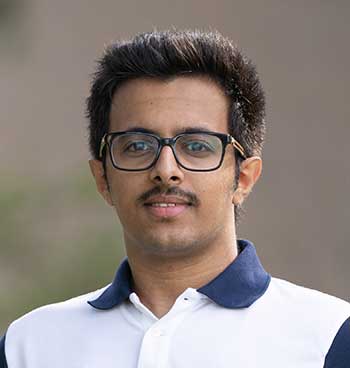 Fares Aljawfi |
Fares Aljawfi began his educational journey in the United States for the spring semester of 2015 at Houston Community College. However, the transition was immediately difficult for him, and it has continued through the pandemic.
“Two months into my first semester here in the states, a civil war started in Yemen, my home country,” he said. “It was very unfortunate and worried me to accept the fact that my family is always under the danger of being attacked by airstrikes. But, my family was always very supportive. With some encouragement from my parents, I decided to continue my journey and never give up on my dream of being an engineer.”
Aljawfi graduated from HCC with highest honors in May 2017, at which point he transferred to the University of Houston to pursue a bachelor's degree in mechanical engineering at the Cullen College of Engineering.
“I was granted temporary protected status in the United States, and I was able to obtain a work authorization card through my new status,” he said. “It was challenging to keep up with my four engineering classes and work a full-time job to help and support myself. Day after day, I had to alter my life and work harder to reach my goals. And by the end of my bachelor's degree, the COVID-19 pandemic started.”
Unfortunately, Aljawfi felt the effects of this worldwide issue directly. His grandparents passed away shortly before he took his senior year finals, and before his virtual graduation ceremony.
“I lived with my grandparents from the age of two to seven years old. I spent five years at my grandparents’ home and I was very close to them,” he said. “They were one of the main reasons I had the passion to continue my education at a university in the United States. They have always been encouraging and supportive, and I never imagined that I was never going to see them again when I left my country back in 2015.”
While Aljawfi has a lot of experience already with remote learning and staying in touch with his family virtually, it hasn't necessarily been by choice.
“During the five years I've been a student here, I have never traveled back home,” he said. “I haven’t seen my family in over five years except in video calls. Airports in Yemen have been permanently closed since the beginning of 2015. It is one of the hardest feelings. I left my home country with the hope that I could see my family every summer or at least every other summer.”
Aljawfi said he was able to finish his degree because of the strong support system he's built in the United States. He was a member of the University of Houston's Formula Society of Automotive Engineers team, helping to design the suspension system for a competition Formula-styled race car.
As far as the future goes, Aljawfi says he wants to earn his master's in mechanical engineering at some point, but he's also open to opportunities in industry. He's also preparing to take the Fundamentals of Engineering Examination, which is one of the steps to become professionally licensed.
When it comes to the past and his work to complete his degree, though, he thinks of his grandparents.
“I had to stay here in Houston to continue my last semester and finalize my senior design project,” he said. “I am dedicating my bachelor’s degree to my grandparents. I wish they had the chance to live and see me graduate, because I was sure that they were going to be so proud of my accomplishments as their oldest grandson.”
ONLINE ALLOWS FOR INCREASED COMMUNICATION, VIRTUAL GRADUATION SPEAKERS
Christian Bernard Alarcon completed his B.S. in biomedical engineering this spring, thanks in part to the support from his friends.
“My groupmates and I, for the engineering senior design projects, we had to switch to using Google Calendar and regular reminders through texts in order to discuss meetings and remind ourselves when Zoom calls would occur,” he said. “Despite not being able to physically work on our projects, we came up with a thorough review of the literature that supports our project.”
Although Alarcon was able to complete his degree, he did have to adjust his research plans with the “Brain on Art Initiative” , which is led by Dr. Jose Luis Contreras-Vidal in electrical and computer engineering.
“We halted plans to run a spotlight exhibition with the Blaffer Museum due to the campus closures,” he said, adding that he was hopeful that something could be done in the future, since he is staying in the Houston area. “We've adjusted our focus from data collection to data analysis and machine learning from years of pre-collected data from other projects.”
Part of the sprint down the final stretch for his degree included regular Zoom calls with his friends, Alarcon said, as web streams replaced face-to-face contact. With everyone forced inside, it even increased communication at times.
“It's strange to say, but we saw each other more often through these online calls,” he said.
The effort to stay in touch culminated with their own graduation ceremony, featuring about a dozen friends. Alarcon said they even had two alumni speakers for the event — Keana Madrinan (UH '18, B.S. in Kinesiology: Exercise Science) and Cameroon Gomez (UH '19, B.S. in Kinesiology: Fitness and Sports).
“It was a fun time,” he said, laughing.
With his bachelor's degree in hand, Alarcon said he will be continuing at the University of Houston this fall, albeit in a different department.
“I'm currently shifting the skills I've learned in biomedical engineering to focus more on clinical biology,” he said. “I'll be staying in Houston to join the College of Natural Sciences and Mathematics masters in biology program.
THE TRANSITION HAS ACTUALLY NOT BEEN DIFFICULT SO FAR. I'VE BEEN PRETTY ACTIVE WORKING FOR DR. CONTRERAS-VIDAL'S ECE LAB, SO I STILL GET TO LEARN TRANSLATIONAL ENGINEERING AND MEDICAL RESEARCH.”

By Stephan Greenwell
A trio of researchers connected to the University of Houston has developed a planning tool to identify vulnerable portions of the population most in need of testing and support, with those along industrial areas and well-traveled waterways at the most risk.
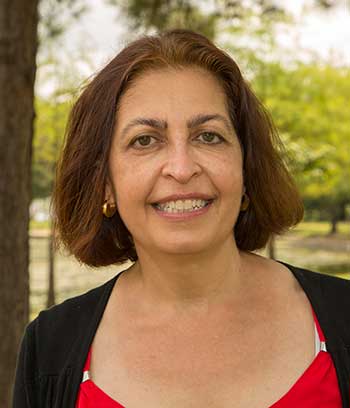 Dr. Hanadi Rifai |
Dr. Hanadi Rifai, a professor of civil and environmental engineering at the University of Houston, is the corresponding author for a new paper, “Assessing COVID-19 Risk, Vulnerability and Infection Prevalence in Communities.” The co-authors are Dr. Winston Liaw, a professor of health systems and population health sciences at the College of Medicine; and Dr. Amin Kiaghadi, a joint affiliated postdoctoral fellow working with Rifai and Dr. Clint Dawson at the University of Texas' Oden Institute for Computational Engineering & Sciences.
Liaw said, “Using this tool, policymakers can identify neighborhoods with a higher potential for becoming the next hot spots, efficiently match community resources with community needs, and ensure that equipment, personnel, medications, and support are available to everyone, particularly the most vulnerable and those in greatest need. This strategy is essential to address historical trends that have preferentially delivered resources to those with means resulting in gaps in quality.”
“The work we did is important, but more than that, it is needed by many decision-makers,” Kiaghadi said. “I am not sure there is any study like this one that could provide a holistic perspective on vulnerability by looking at various aspects of it.”
Rifai said that based on preliminary analyses, there are some population groups — such as older people, those with preexisting health conditions or people with respiratory illnesses — that are more at-risk for transmission of and death from the coronavirus. By using census data, Rifai said their goal was to identify these populations ahead of time to proactively guide public resources.
“We're not saying this is the final answer, we're saying that the framework is an advisable one for our communities going forward,” Rifai said. “If you're in a higher vulnerability category, then you can make an informed decision to work remotely and prevent exposure.”
For their work, the researchers identified five categories of at-risk populations:
- People with limited access to hospitals and medical care.
- People with underlying medical conditions, like respiratory illnesses and hypertension.
- People with higher environmental exposures like air pollution and water contamination.
- People in areas vulnerable to natural disasters and flooding.
- People with specific lifestyle factors, like obesity, drinking and smoking.
According to the paper, the highest-overall risk areas based on all five categories are in economically disadvantaged communities along with those located near the Houston Ship Channel (HSC) and the east and northeast parts of the county, while the populations with the least combined risk factors were in the western fringes of Harris County.
Kiaghadi said, “The fact that if you live in a specific part of the county, that makes you more vulnerable to the disease because you have been exposed to chemicals, or in an area prone to flooding, and have less access to medical care, is something I wanted to highlight by doing this research.”
According to figures from the paper based on 2018 census tract data, there are 722,357 residents of Harris County — about 17 percent of the population — in at least one risk category. Of this group, 171,403 are between 45 and 65 years old, and 76,719 are 65 years old or greater — both of which have been identified as being higher at-risk groups for death from COVID-19.
Rifai said that that in some ways, the current COVID-19 pandemic had similarities with the research her group has done previously on natural disaster response.
“In my group, we have been engaged with national disaster research for more than 15 years now, since Hurricane Katrina, and this is really a natural disaster caused by a biological agent,” she said. “It has a significant effect on everyday life, like natural disasters do, it has just carried on for longer.”
Similar to a natural disaster, dealing with the pandemic puts stress on the social safety net, and factors like the proximity to a hospital can effect outcomes. Rifai stressed that their research is meant as a tool to provide rough guidance as to where resources will need to be allocated.
“If you're going to turn business back on, you want to know where to test and protect first,” she said. “It's a planning tool that holistically looks at the population in Harris County, with the data available. If you expect people to get sick in parts of the city and you don't have hospitals that can handle it, you need to account for that.”
Rifai also noted that as more data became available, they would be able to fine tune the model.
“Our testing rate is among the lowest in the United States, and it would be really nice to test more in those areas,” she said. While there is still much work to be done, the framework may be able to help move efforts in the right direction.
Rifai said they hoped to be able to expand beyond Harris County with more data.
“LOOKING INTO THE FUTURE, WE'D LIKE TO EXPAND ON THE MODEL AND INTO OTHER GEOGRAPHICAL AREAS OF TEXAS,” SHE SAID. “IF WE GAIN ACCESS TO THE INFORMATION, WE CAN HELP WITH SUPPORTING DECISION-MAKING.”

By Laurie Fickman
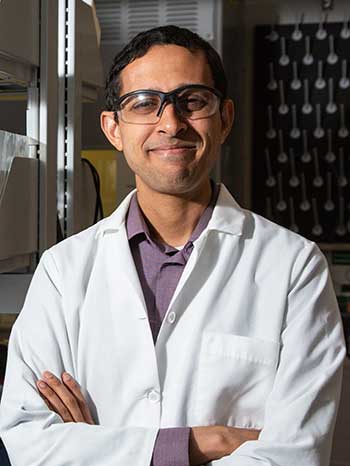 Dr. Navin Varadarajan |
Navin Varadarajan, M.D. Anderson Associate Professor of Chemical and Biomolecular Engineering is testing inhalation vaccines. Think FluMist for COVID-19.
“For airborne pathogens, the nasal mucosa is the first point of defense that needs to be breached,” said Varadarajan. “Mucosal immunity and vaccines are fundamentally important for a wide range of pathogens including influenza, severe acute respiratory syndrome coronavirus (SARS-CoV) and the current SARS-CoV-2.” Still, he said, nasopharyngeal immunity is understudied.
Varadarajan is using the spike protein, which helps the virus enter the target cell and is the major target for neutralizing antibodies as it binds to the cellular receptor called angiotensin converting enzyme-2 (ACE2) for virus entry. He prefers using proteins because of their ability to induce strong immune responses, flexibility and scalability, and absence of infectious particles.
Varadarajan notes several considerations of pivotal importance in designing an efficient, but safe mucosal vaccine.
“As with any vaccine, a variety of factors determine their efficacy including the antigen used for electing a response, the adjuvants and immunomodulators, the efficient delivery of the antigen to appropriate target cells, and the route of vaccination,” he said.
Varadarajan is collaborating with Xinli Liu, associate professor of pharmaceutics, who is synthesizing a new liposomal adjuvant.
By Chris Stipes
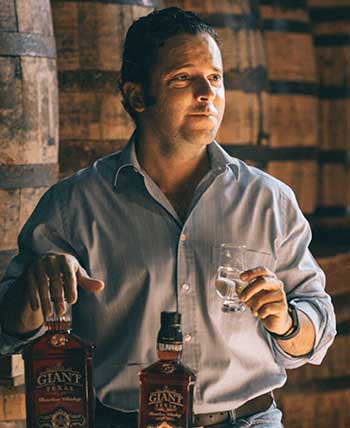 Carlos De Aldecoa — photo provided by distillery |
Weeks before the novel coronavirus reached the United States, Carlos De Aldecoa (BSIE ’97) got a frightening taste of its wrath — his aunt in Madrid, Spain was hospitalized with COVID-19. After several weeks in the intensive care unit, she managed to recover. But De Aldecoa knew it was only a matter of time before the invisible enemy would reach the U.S. and wreak havoc at home. Now was the time to prepare, he thought.
“There was a lot of talk about how cleanliness and sanitizing was critical to stopping the spread of the virus,” said De Aldecoa.
It wasn’t long before stores across the country were sold out of alcohol-based hand sanitizer (and toilet paper, but that’s a different story altogether). Alcohol-based? It was a light bulb moment for De Aldecoa, who manufactures liquors and spirits for a living. As president and CEO of Texas’ largest distillery, Gulf Coast Distillers on Houston’s East End, the University of Houston alumnus recognized a unique opportunity to shift operations from producing distilled spirits — vodka, bourbon, whiskey and gin — to making hand sanitizer.
“We already have bottling operations and sourcing of ethanol. We have the team, facilities and equipment, so let’s quickly retool and do our part to help the community stay protected,” De Aldecoa recalled of his idea to shift production efforts. He then applied for an additional industrial permit for alcohol manufacturing from the federal government to begin production.
SPIRITS TO SANITIZER
In just a matter of weeks, C4U hand sanitizer was created, named after Carlos's 5-year-old son, Carlos IV. Since mid-March, bottling operations have been running around the clock, six days a week. By the middle of May, the distillery had produced an astounding 500,000 gallons of sanitizer, or as much as 15,000 gallons per day.
C4U is being sold in retail locations across the country, but the company has also donated more than $325,000 of product to first responders, hospitals and non-profits. And while many industries have been forced to lay off or furlough employees due to COVID-19, De Aldecoa added about 35 employees to his family-run operation, including many out-of-work restaurant and hospitality workers.
That’s not to say there haven’t been challenges. After conducting extensive research on federal and state regulations for the manufacturing of sanitizer, the company faced “significant issues” sourcing materials, including bottles, caps and ingredients for the sanitizer itself. But solving problems is what De Aldecoa does best, even dating back to his time at UH’s Cullen College of Engineering where he earned a bachelor’s degree in industrial engineering in 1997.
A year after graduation, he founded Cadeco Industries with his father, growing the family coffee business started by his grandfather in the 1920’s in Spain. Family always comes first for the De Aldecoa’s. Carlos’s four sisters, two of whom are also UH graduates, have pivotal roles within the family’s group of companies. María Patricia Echeverry, the company's vice president of operations, also has an M.S. in industrial engineering from the University of Houston.
DISTILLING KNOWLEDGE
Juan Carlos Martinez De Aldecoa, Carlos’ nephew, represents the fourth generation of the business. The 20-year-old works as brand director for the distillery while also juggling classes as a full-time UH student.
“To be able to work alongside my uncle and grandfather and the rest of my family during this unprecedented time is something I’m really grateful for. I’m like a sponge, and I love to learn,” said Juan Carlos, a sophomore interested in studying entrepreneurship, business and economics.
Juan Carlos started working at the family company at 14, filling bags of coffee by hand and sweeping floors, but listened closely to how his relatives conducted business, always taking notes and staying laser-focused on his goals.
“My goal is to be an innovator and risk taker and come up with creative ideas to grow businesses,” he said. “But even more important I want to leave a footprint in this world … not just come, make money and leave. I want to make a difference.”
The pandemic has proven to be a real-life lesson in business for Juan Carlos — he’s seen his family’s company navigate supply chain disruptions and regulatory issues. He’s bore witness to innovation, as operations pivoted, becoming more relevant while also filling a desperate need during a crisis.
“We switched our focus to sanitizer because we knew we had the potential to help out,” Juan Carlos said. “We didn't want to furlough employees like many people were doing. We wanted to be creative, and with [Carlos] being an engineer from U of H, his degree really helped him out here. He got creative and decided it was time to think outside of the box, and not do what everyone else was doing, so he turned distilling alcohol into making hand sanitizer. We are the largest distillery in Texas, and as such, we set a very large precedent for all the other distilleries in the country.”
“Surround yourself with positive people. Have a winning team with a winning attitude and put your heart into it,” said De Aldecoa. “Whatever you do in life, just be passionate about it and know it’s going take a significant amount of work.”
As for the work making the much-needed sanitizer? De Aldecoa said it will continue as long as the market demands it.
“The more we can pump this stuff out, the more we can control the spread of the virus and that’s really what we’re trying to achieve.”

C4U product — photo provided by distillery
By Stephen Greenwell
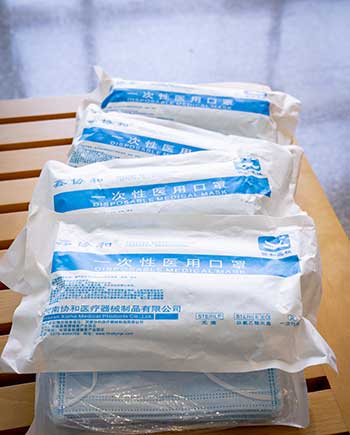
As the coronavirus spread throughout the United States, one Cullen College of Engineering alum felt compelled to act and to support the university that helped him.
GQ Guo graduated from the college with a master's in petroleum engineering in 2017, but continued to monitor the pandemic in Houston following his graduation. When one of his friends in China opened a mask factory, Guo arranged to send 800 masks to the university.
“Thanks to him, I managed to obtain the masks and shipped them to UH immediately,” Guo said. “It is hard to say what motivated me exactly. I was just feeling that I needed to do it. I needed to take that responsibility.”
The masks were received by Dr. Mohamed Soliman, the petroleum engineering department chairman and the William C. Miller endowed chair professor. Soliman said he remembered Guo well, from when he was a student at the college
“This guy was so active, I was extremely impressed,” Soliman said. “He brought people from industry to talks, facilitated donations and was really doing a first-class job … After he got a job here in the states, I wasn't surprised at all, because he's a very energetic guy. Only a year or so later, he decided to quit and form his own company.”
Soliman noted that this was not the first time that Guo had donated to the department and the Cullen College of Engineering.
“He came to my office for a graduation party, and he told me he wanted to donate something to the party,” Soliman said. The donation meant a lot to Soliman, noting the position most graduates are in.
Guo said the supportive environment of the college always encouraged him to give back. He started GQ (Good Quality) Petro LLC. in July 2017, shortly after his graduation. It provides consulting services, technical training and market research to bridge North American and Asian energy markets. When Guo's company made its first profit in April 2018, he donated to the university again.
“If you are in a place where everyone is passionate, energetic and optimistic, you will be one of them,” he said. “Another reason is belief. I believe in UH, and I trust my professors and my friends over there. I feel proud of it. No matter what happened, I knew UH friends and faculty were backing me up.”